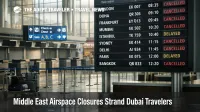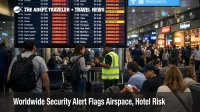Air Travel

When it comes to travel, especially air travel, there's something inherently thrilling about the whole process. Think about it—you start by dreaming of far-off places, then you find yourself navigating the bustling airport, boarding the plane that will whisk you away to your destination. It’s a journey that begins long before takeoff, with whispers of anticipation winding their way into your day-to-day thoughts. You ever notice that? Like this subtle intrusion of wanderlust, tiptoeing into your routine, making the prospect of air travel not just a means to an end, but an experience in its own right.
There's the small rituals people develop while flying. Some swear by a pre-flight coffee, others delve into books they only read on planes. Air travel encapsulates these routines, creating an unofficial checklist of actions and habits. Often, it’s these little things that make your journey uniquely yours. It’s kind of funny, now that I think about it—how a cup of airport coffee or the latest issue of your go-to magazine becomes an essential part of travel.
The Paradox of Air Travel Convenience
What strikes me about air travel is its paradoxical nature. It's incredibly convenient, sure, but at times, it feels anything but easy. Long lines, security checks, and delays; they test your patience and—may I say—sanity. Yet, these are the quirks that give air travel its character, shaping not just your experience but your stories too. Weirdly enough, they end up being tales you recount with a mix of exasperation and fondness. Isn’t it strange how an airport delay can turn into an amusing anecdote over dinner long after the fact? It’s this contradiction that sticks with me, the way air travel sums up both the irritations and joys all wrapped into one.
Air travel has altered drastically over the years, with innovations making flying more convenient, even if it doesn’t always feel that way. Think about how online check-ins and digital boarding passes are almost a given now. The way airports have adapted, not just in terms of technology, but in service and experience, reflects the growing expectations of travelers. Have we become spoiled by these advancements? Maybe. But it's fascinating to consider how each adaptation shapes our journey.
The Transcendent View from Above
Another thing about air travel that's magical, and I’m sure you’ll agree, is the view. Once airborne, we’re treated to breathtaking panoramas you just wouldn’t get otherwise. There’s this moment after takeoff—somewhere between leaving the ground and reaching a cruising altitude—where the world below looks like a sprawling patchwork. Cities shrink to toy-town proportions, landscapes transform into living maps, and it’s mesmerizing. Honestly, there's a sense of humility and awe when you realize just how vast the world really is. Come to think of it, air travel isn’t just about getting you from Point A to Point B. It offers a perspective that subtly shifts your outlook. Isn’t that something?
Yet, for some people, this view is not just a trivial aspect of air travel—they obsess over window seats, planning and strategizing to ensure they get the best view possible. It’s almost competitive in a non-serious way. And while I’m more of an aisle person myself, there’s undeniable excitement when you’re peering through the porthole—clouds suspending in their ruffled wisps, the setting sun casting fiery streaks of red across the horizon. Sure, air travel can be about the destination, but moments like these remind you that the journey itself is one to savor.
The Social Dynamic at 30,000 Feet
Let’s talk about the social aspect of air travel. When you're suspended thousands of feet above the ground, you share that space with total strangers. It’s interesting how these interactions—or lack thereof—shape parts of your travel experience. There’s a curious mix of camaraderie and seclusion up there. On some flights, you might strike a conversation that blossoms into a meaningful connection. Other times, you find yourself in your own bubble, lost in thought or entertainment. It’s a unique social dynamic unfolding with every flight.
Though, truth be told, not everyone enjoys these interactions. Some travelers prefer the solitude of their thoughts, diving into movies or trying to catch that elusive in-flight sleep. There's a lot to ponder over the unwritten etiquette up there. What makes a good airplane chat partner anyway? Or even a good airplane neighbor? You know, the kind that politely offers their armrest or swaps seats to help a family sit together. It oscillates between fascinating and frustrating, depending on your flight.
The Environmental Quandary
In recent years, air travel has faced scrutiny about its environmental impact. The carbon footprint left behind by flights is substantial, and it’s prompted discussions about sustainability and change within the industry. Here lies another contradiction—an industry that connects people also grapples with the question of how to minimize its environmental damage. This dilemma is not one with easy answers. As travelers, we’re encouraged to fly less, yet the allure of faraway destinations remains a potent pull.
Many airlines are focusing on innovating to reduce emissions, investing in more efficient aircraft and exploring alternative energy sources. However, it’s not enough. We as travelers have a role too, exploring options like carbon offsets or choosing airlines that demonstrate a commitment to sustainable practices. It’s complex, thinking about how our personal travel choices resonate on a larger scale, but it’s worth considering.
To wrap this up, think about how intriguing air travel really is. It's not just a mechanized process or a series of flights and connections. It's deeply personal, universally shared, and inherently complex all at once. Even now, when I pause and reflect, there’s so much more beneath the surface—elements I've only begun to touch on, stories waiting to unfold. Air travel is a slice of human experience that, in its crowded cabins and echoing terminals, leaves room for reflection, reinvention, and perhaps a little bit of dreaming. Isn’t it funny how that all works out, how every flight is both an end and a beginning?
Japan Power Bank Rules Cap Two, Ban Use From Mid April

UAE Exceptional Flights Restart From Dubai and Abu Dhabi

Iran Strikes Trigger Global Flight Cancellations

Southwest Assigned Seating Tweaks Target Bin Space

Middle East Airspace Closures Ground Gulf Hubs

Chicago O'Hare Summer Flight Cap Planned by FAA

Tel Aviv Ben Gurion Reopens, Overland Exits Key

Middle East Airspace Closures Keep Global Reroutes

Middle East Airspace Closures Strand Dubai Travelers

Flight Delays and Airport Impacts: March 2

Milan Airport Ground Handling Walkout March 18, 2026

Belgium March 12 Strike Could Ground Brussels Flights

Middle East Airspace Closures Ground Flights Feb 28

Etihad Pauses Abu Dhabi Departures March 1, 2026

Middle East Airspace Closures Extend Into March 1

UAE Airport Recovery Delays Dubai, Abu Dhabi March 1

Worldwide Security Alert Flags Airspace, Hotel Risk

Flight Delays and Airport Impacts: March 1

Shutdown Hits TSA Staffing, Airport Lines Less Predictable

Doha, Dubai Hub Pauses Break Connections Feb 28

Bangladesh Biman Suspends Gulf Flights Feb 28, 2026

Middle East Airspace Closures Snarl Gulf Hub Flights

Middle East Airspace Closures Halt Dubai, Doha Flights

Flight Delays and Airport Impacts: Feb 28

Qatar Cuts Iran Flights, Limited Tehran Service to June 30

